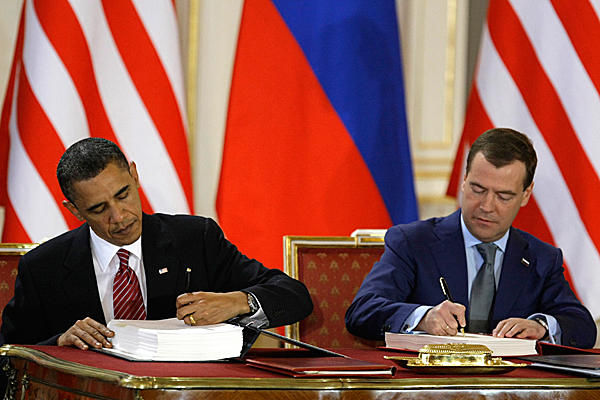
Moscow Shows Anxiety Over Passing the New START Treaty
Publication: Eurasia Daily Monitor Volume: 7 Issue: 209
By:

Even before the US midterm elections, the Russian government and media expressed concern that the New START treaty, signed in Prague in April of 2010, might not obtain ratification (ITAR-TASS, October 18, 28; Novaya Gazeta, October 25). There is no doubt that the Russian government hopes for a speedy ratification of this treaty, which is the centerpiece if not the foundation of the new reset policy and efforts at Russo-American rapprochement (Radio Free Europe, November 12). Officially, Moscow says there is no slowdown in the ongoing relationship (RIA Novosti, November 8). Neither is there any doubt that the Obama administration seeks its passage in the lame duck session of the US Senate, which reconvened on November 15. Indeed, US Assistant Secretary of State, Ellen Tauscher, said this was the last chance to ratify the treaty (www.nti.org, November 10). But once the returns were in, a visible mood of anxiety settled among the Russian punditocracy and government concerning the fate of the treaty.
On November 3, the day after the US midterm election, the Duma’s foreign relations committee essentially recanted its recommendation of ratification and held the treaty back for debate, reflecting its apprehension over ratification by the Senate and cited the Senate’s three points of understanding saying that the US is to apply the treaty to combat railway-based missile systems, and that the treaty does not limit the Pentagon’s missile defense efforts. It also emphasizes that the treaty does not cover non-nuclear weapons. All three of these statements strike at key Russian objectives, but it is also clear that ratification is the main concern (ITAR-TASS, November 3). Likewise, its Chairman, Konstantin Kosachev, expressed his personal concerns about the treaty’s fate and the US Senate’s understandings (ITAR-TASS, November 3). Since Kosachev often speaks for the Russian government, he clearly was not only voicing his private opinion. Indeed, some analysts like Sergei Karaganov, the Chairman of the Moscow-based Presidium of the Council on Foreign and Defense Policy, fear that the US Senate may attach legal conditions to the treaty that would force Russia to refuse to ratify it (RIA Novosti, November 3; Vedomosti, November 8).
Soon afterwards, the Russian media perhaps encouraged by President Barack Obama, Secretary of State, Hillary Clinton and other officials’ praising the treaty and calling for its ratification, began publishing positive accounts of the reset policy and the treaty. Mikhail Margelov, the Chairman of the Federation Council’s International Relations Committee, expressed his optimism (Interfax, November 3). Vyacheslav Nikonov, the Chairman of the Politika Foundation (another pundit close to the government), stated his optimism that even if the treaty failed to pass, although he does not believe that will be the case, the positive dynamism of US-Russian relations would continue (RIA Novosti, November 3). Similarly, the Russian press published interviews with distinguished US experts such as Robert Legvold, Professor Emeritus at Columbia University, expressing comparable optimism that the treaty might pass and that relations would go forward (RIA Novosti, November 10). But Legvold warned that failure to ratify the treaty would seriously set bilateral relations back and damage Medvedev’s and Obama’s push for reset (RIA Novosti, November 10). Likewise, and somewhat unusually, the Russian press also published statements by Senators John McCain (R-Arizona) and Lindsey Graham (R-South Carolina) supporting the treaty and recommending to their colleagues do so. However, they were admittedly concerned that the treaty might not be ratified (ITAR-TASSS, November 9).
All these articles suggest the extent of Russian nervousness about the fate of the treaty and of linked agreements like the 123 agreement concerning bilateral civilian nuclear cooperation that would be very lucrative for Russia. These anxieties are not for show though it is clear that Moscow, as is often the case, is trying to hide them. If the arms control treaty fails, Moscow has no means to stop US progress either on missile defense or on enhancing its global strike program, perhaps the single most frightening military threat perceived by Moscow. Similarly, Moscow will have little to show for its cooperation with Washington as it canceled its lucrative arms sales program with Iran, losing several million dollars, as part of the program of cooperation that characterized this rapprochement.
Moscow would also lose valuable potential and actual economic gains. Failure to ratify the treaty could undermine the entire edifice of the new cooperation like the treaty on civilian nuclear cooperation, Russian entry into the World Trade Organization (WTO) and the Obama administration’s efforts to bring about what has always been lacking in bilateral relations: a solid economic underpinning creating a community of interest on both sides to uphold and sustain ties through difficult times (The Moscow Times, November 8). These are among the fears expressed by pundits who have publicly registered their anxiety about the future course of the relationship (RIA Novosti, November 3; www.pravda.ru, November 3).
Finally, failure of the ratification process confronts Russia with very difficult questions concerning the future course of its military policies and investments. If it cannot have mutual deterrence and arms control at more affordable levels as it spends huge amounts to modernize its army’s conventional weaponry, how would it react to that outcome? Certainly, there are those in the Kremlin who harbor unceasing suspicion of US interests, goals, and capabilities and those who would like to continue to place their priority on nuclear weapons in a strongly anti-US stance. Should the treaty fail to be ratified they would be emboldened, but can Russia afford both a sizable nuclear and huge conventional modernization? Therefore, the concern in the government and media about the outcome of the treaty is well founded because its failure will then confront Russia with a host of unpalatable situations that require major policy decisions in an environment of competitive foreign and defense policy agendas, leading to an outcome that no government looks forward to facing.




